- Home
- Linda Byler
Big Decisions Page 16
Big Decisions Read online
Page 16
Stephen returned with Mr. Weaver, tied George to the hitching rack, and then they were off across the drive and down the lane leading to the tomato plants. Lizzie had to walk fast to keep up with Stephen. Robert had shown him where they could start picking, which proved to be farther away than it had appeared at first.
There was a stack of black plastic hampers turned upside down at the rows where they would begin. Eager to show Stephen what an accomplished tomato-picker she was, she stepped right up to the hampers and easily pulled several from the tall stack. She walked along, scattering a few ahead of them. She turned to find Stephen with his hat pushed back, scratching his head in bewilderment.
“Lizzie, it’s going to take all evening to fill 10 baskets, and that’s two dollars and fifty cents. This is not the smartest thing we’ve ever done.”
Bending to the task, Lizzie lifted the dying tomato vines to find an absolute trove of large ripe tomatoes all piled in one heap.
“Look, Stephen. This is no problem. Watch. How long does it take to fill a hamper when there are so many of these huge red tomatoes on top of each other?”
She began pulling at the tomatoes, remembering how easily they were removed from the stalk, and slamming them into the bin as fast as she could. She pulled tomatoes, showing off for Stephen and going much faster than what was absolutely necessary.
Stephen watched, then grabbed a hamper.
“I’d rather be building pole barns,” he grumbled, but he soon began throwing tomatoes into the hamper, keeping up with Lizzie.
She said nothing, grimly determined to pick as many tomatoes as she possibly could. The sun slid down, the air began to cool a bit, and still they kept picking tomatoes. Lizzie’s back hurt horribly, but she was determined Stephen wouldn’t know, as he showed no signs of slowing.
They were both on their tenth basket now, so Lizzie figured at 25 cents a basket, they would have five dollars for 20 baskets. That was far from 20 dollars, though, and her back could not stand one more basket before she would collapse into a heap in the tomato stalks. Straightening up, she rubbed her back with both hands, grimacing as she did so.
“Doesn’t your back hurt?” she asked, watching intently as Stephen kept on picking, whistling under his breath.
“Hmm-mm.”
“Not one bit?”
“Hmm-mm.”
No use showing her weakness now, she thought grimly. I can’t stand bending over picking things too long at a time, but he’s not going to find out. This was my idea. Groaning inwardly, she bent over and began her eleventh basket, glancing over her shoulder to see how far away the sun was from dropping behind the mountain. Pretty far.
“Stephen, what time is it?” she asked.
He straightened, pulled his watch from his pocket and said, “Six-thirty.”
“Is that all?”
“What do you mean, is that all? If we’re going to make 20 dollars, we still have a long way to go.”
Lizzie nodded, bent her back, and picked tomatoes as if a mad bull would attack her if she didn’t keep up with Stephen. Now the backs of her legs hurt miserably, a dull ache that went clear down to her ankles. But on she toiled, her only source of energy derived from her stubborn will and determination to prove to Stephen that she could pick tomatoes as fast or faster than he could.
Lizzie kept going, trying to think of any subject to take her mind off the pain in her back, but nothing worked for very long. She thought of shrubs, lawns, flowers, the porch Stephen wanted to build, but nothing made her feel better. She thought of the way they tortured prisoners during wars to get them to talk about secrets they needed to know in order to win a battle. Tomato-picking could work as torture. She wondered if anyone had ever thought of that before. It would be a very good idea. Lizzie decided she would tell anyone just about anything to get out of this torturous backache. She would even tell Stephen her back hurt, she finally admitted.
“Stephen!” she blurted out.
“What?”
“My back hurts. Let’s quit.”
Stephen straightened and looked quizzically at her face. It bore the pain of the past hour, with her eyebrows poking straight up in the middle, her eyes resembling a coon hound’s, sad and begging for pity. He tried desperately to keep a straight face, certainly not wanting to laugh at his wife if she was suffering. But the suffering was only half as bad as she portrayed it, of this he was positive.
In the short time they had been married, he had learned to know her quite well. She preyed on his pity, which really was all right, actually a bit endearing, except for now. Whose idea had this been, anyway?
“How many baskets did we pick?” he asked.
“Don’t worry about that, Stephen. Don’t you care one tiny bit about my back? I’m going to ruin it for the rest of my life, I mean it.”
“Lizzie, this was your idea.”
Suddenly her face turned beet red and she leaned forward, clenching her fists. “Stop saying that, Stephen!” she yelled. “You didn’t have to come with me. It’s your fault, too!”
He hurriedly bent his back, picking tomatoes so she couldn’t see him laughing. His shoulders shook, and he sputtered to keep from laughing out loud, knowing her anger would only increase if she saw that he thought it was funny.
“Why don’t you say something?” she asked, still angry.
“Oh, go pick tomatoes, Lizzie. You’ll be all right,” he managed, behind the huge grin on his face, which by now he had turned away.
By the time the sun actually, finally, slid behind the mountain, casting a spell of shadows across the abundant field of tomatoes, Lizzie was seriously afraid she would not be able to find enough strength to return home. She would probably need to spend the remainder of the night in the tomato patch.
Stephen rubbed his grimy hands together.
“That was fun! We made 25 dollars! A good start. If we return tomorrow evening, that will be 50. A fourth of what I’ll need. Probably not even that much.”
Lizzie hobbled between the rows, rubbing her lower back and glaring at her husband.
“I’m not coming back,” she said shortly.
“Really?”
“No.”
“Ach, come on, Lizzie. Be a sport. Till tomorrow evening you’ll be used to it.”
Lizzie was going to answer, she really was, but nothing would come out of her mouth. For one thing, she was almost crying, and for another, if she didn’t answer, then maybe he’d worry about why she didn’t and start to say things husbands should say. Things like she did so well, and he appreciated her help, and he loved her very much, and he never saw anyone pick tomatoes as fast as she did. Things that would make her want to help him save money to buy his archery supplies.
They finished up in the field. After they were paid, Stephen untied the horse and they headed home. It felt very good to sit beside him in the buggy and pity herself, but it bothered her that he was whistling low under his breath, intently looking out the side door for deer. They wound their way up the hill beside the creek and through the woods until they came to a halt on the main road. George chomped impatiently on his bit as they waited for a few cars to pass.
It was a lovely evening, the last glow of light making everything look prettier than it actually was. Farmhouses and barns that weren’t perfect because of a rusted roof, faded siding, or sagging shutters suddenly appeared almost brand new and beautiful in the fading half light of a summer evening. Cows grazing in the pasture after milking seemed much cleaner, and the pasture itself appeared even and dark green with no thistles or cow dung in it. It was amazing. Without thinking, she told Stephen this, and he turned to look at her, slid an arm around her, and held her tightly against his side. Lizzie was startled, then grinned smugly to herself.
Ah-hah! He DID appreciate her. He just wouldn’t tell her in so many words the way her family did at home. Snuggling against him, she already looked forward to another evening of picking tomatoes, backache or not.
So during the cou
rse of a few weeks, Stephen and Lizzie made 184 dollars. Lizzie’s back actually became used to the work, and she learned how happy you could become by doing something unselfish for your husband. Stephen even asked her to go along to the archery shop, but she declined, knowing he would enjoy it more without her waiting impatiently by his side.
Then, one glorious week in August, the excavator spread the topsoil. They let it settle for a few weeks, then bought grass seed and fertilizer. Stephen brought bales of straw from his father’s farm. Their friends, Dan and Leah Miller, offered to help them with their lawn since they had seeded their own yard the year before.
The evening Stephen and Lizzie decided to seed the lawn turned into a fun-filled, festive evening. First, everyone raked the soil until it was fine and smooth, removing small rocks and leveling uneven hills of dirt. Dat and Jason arrived with their own rakes, Mam brought homemade cinnamon rolls, and they all worked on the new lawn, moving along the front of the house, down the opposite side of the driveway, and all along the sides and back of the house.
Then, while everyone else rested, Dan and Stephen spread the fertilizer and seeds, raked lightly again, and spread straw to absorb the moisture and protect the tiny little seeds. Lizzie washed her hands well, made coffee, mixed iced tea, and then served a good snack. They all sat around the table, enjoying each other’s company and Mam’s delicious cinnamon rolls.
No one knew, though, quite how happy Lizzie actually was. All those weeks of anticipation and waiting until Stephen was ready to seed the lawn had been very hard for her. She wanted things done right away without waiting four weeks. But now here they were on a warm, balmy evening with their very own lawn properly seeded. Lizzie was quite confident she would have a beautiful lawn by the next spring.
She chewed happily, smiling at Leah, who was a petite, tiny woman, about eight years older than Lizzie. She was indeed a good friend, giving Lizzie advice about different things, including how to get along with your husband, which Lizzie really appreciated. Lizzie was a bit dubious about being the willing servant that Leah talked about, but it was something to think upon, especially the part about never grumbling or nagging, which was very hard for her.
What other way was there if you wanted something done? Especially if you wanted it done now and not two months later? Oh, well, tonight nothing mattered except the friendship of these two kind and helpful people, Dat and Mam and Jason, and the fact that, finally, at long last, they had a lawn. Now for the shrubs.
Chapter 17
LIZZIE WAS ENJOYING A dish of strawberry ice cream while sitting at a picnic table in the park with her friend, Julie, who she worked with while grading eggs. Suddenly, the ice cream tasted like Pepto-Bismol and the succulent strawberries took on a shiny, grainy quality that turned her stomach. Waves of nausea rippled up her throat, and she looked over at Julie, a bit wild-eyed.
“I don’t feel one bit well,” Lizzie said shakily.
Julie raised an eyebrow.
“We’re not expecting a baby, are we?”
“No,” Lizzie said firmly. “It has to be a bug.”
“Oh, but Lizzie, some bugs turn into a serious malady called pregnancy.”
“I know, Mam told me that.”
Lizzie was a bit miffed, sitting there feeling so terribly sick and miserable, the ice cream melting in it’s Styrofoam dish and sliding farther and farther down her lap as she held it in her nerveless fingers. Julie didn’t have to talk to her in those condescending tones, as if she was only 12 years old.
The ride home was pure torture. Lizzie was humiliated beyond words when the movement of the car made her so dizzy that the strawberry ice cream churned in her stomach. She had no choice but to ask Julie to please pull over and stop as soon as she could. When the car came to a stop, Lizzie opened the door, lurched into the deep weeds at the side of the road, and threw up the strawberry ice cream.
“Oh, dear, I am so embarrassed,” she said, as she climbed back into the car.
“It’s all right, Lizzie. There’s a bug going around.”
Lizzie glared at her friend, and they both burst out laughing.
Julie was right. Lizzie and Stephen were ecstatic to find out they would be parents. Stephen smiled everywhere he went—to work, to church, to visit his parents—which only increased Lizzie’s own anticipation.
Mam smiled and nodded when Lizzie told her the news. They discussed babies, mother, hospitals, doctors, buying baby clothes, just everything. Mam told her in a serious sort of way that having a baby wasn’t easy.
Lizzie took this to heart, although she told Stephen she could handle her pregnancy just fine. She was tough. She could work as hard as he did, well, almost, and she was healthy, robust, and certainly not weak or skinny.
The weight gain began then, which was a constant source of frustration for Lizzie. The doctor told her 25 to 30 pounds was ideal, and she was determined to stay within those boundaries. At first, it was easy. Foods that were ordinarily delicious turned into vile, unappetizing concoctions that propelled her in the direction of the bathroom, and she threw up almost anything she ate.
Saltines and ginger ale. Pepsi. Ginger tea. Dry toast. Pretzels. It all came back up. Just when she thought she must surely die, unfairly, at a young age, she noticed that the smell of vegetable soup was no longer quite as nauseating. She could eat cheese sandwiches with mustard, which perked her up considerably.
After her nausea passed, her appetite came roaring back. She wanted to eat everything she saw, from the time she got up until she went to bed. She baked whoopie pies, wrapped them individually in plastic wrap, and kept eating them just about all day.
The thing about whoopie pies is that they stick to the plastic wrap in chocolaty layers, and when you pull the wrap away, the part underneath is so soft and good and so close to the creamy white frosting that you take one big bite after another, and before you know it, it’s all gone and you want another one.
Lizzie faithfully swallowed her prenatal vitamins, ate healthy foods—orange juice, peas, tomatoes, peaches, and corn—as well as whoopie pies. She went to visit her doctor regularly and immensely enjoyed all the attention she received. Emma and Mandy were overjoyed that Lizzie and Stephen would soon be parents. So much joy, Lizzie thought, as she headed to the hospital with Stephen the night her labor started. I just can’t wait for this baby.
Hours later, Lizzie was startled by a strange sound in the hallway, waking instantly when she realized where she was and why she was not at home in the little house on top of the hill. She and Stephen were parents now. She had given birth to a little girl the morning before at the hospital in Cedar Falls.
The baby, her baby, weighed seven pounds and one ounce, a perfect miracle, with a deeply tanned complexion, almost as if she had been lying in the sun before she was born. Her eyes were blue, her nose was only a little bump—not really a nose yet—and her mouth was small and perfect. Lizzie was thrilled and very, very scared of this little human being that she was suddenly responsible for forever.
They hadn’t decided on a name. Lizzie had informed Stephen quite early that if the baby was a girl, she would name her Laura for Laura Ingalls Wilder, the heroine of Lizzie’s life. Stephen didn’t say no or yes. He just smiled and didn’t make a comment at all, but Lizzie figured his smile must have meant something like an approval, so she went right on thinking about a baby girl named Laura.
She felt a tiny bit guilty about that fancy name. Amish people were encouraged to give their babies plain names like Sarah, Barbara, Anna, and Rebecca, old Bible names that the Amish had used for generations. The thing was, if you really wanted to know which Sarah or Barbara someone was speaking of, you had to add her grandfather’s name and her father’s name to identify her. You couldn’t just say Barbara Zook or Anna Stoltzfus. You had to say, “She is one of Dan’s Sammie’s girls.” It was quite frustrating.
Take her own name, for instance. Lizzie Glick. Her dad’s name was Melvin. But which Melvin Glick? There were lots
of Melvin Glicks in the large Amish community surrounding them. So you had to say Doddy Glick’s name, and then Dat’s, before people knew who she was.
Besides, she liked something different, something pretty. Like Laura. It was old-fashioned, for English people, anyway, and it had a nice sound, especially when she added the middle name, Anne.
So here she was, waking up in this strange place, her heart sinking when she thought of the previous night. She had been so very tired, wanting to sleep so desperately, but they kept bringing Laura in, saying it was time for her to eat. But no matter how much the kind nurses tried to help, or in what position she held Laura, she refused to nurse for longer that a few tense seconds. The whole night had been a complete disaster. Lizzie fought tears of despair, she was so upset about the ordeal of trying to breast-feed her baby, who, apparently, was absolutely clueless as to what was required of her.
Lizzie sighed and smoothed the blanket a bit self-consciously as a very large nurse opened the door with her foot and bustled efficiently about the room. She checked Lizzie’s blood pressure, took her temperature, poked and prodded her, and asked questions fast and furious like a game of ping-pong. Lizzie was having trouble keeping up with the ball.
“Time for your shower!” the nurse chirped. “Breakfast at eight!” Lizzie groaned, thinking about getting out of bed, but soon realizing that she had absolutely no choice whatsoever, without even a minute of reluctance. Her sheets were pulled back, a pair of very large solid arms were extended toward her, and she was propelled out of bed, her head spinning, the room seeming to tilt permanently to the left. She shuffled to the shower, depending on this solid pillar of strength beside her.
Lizzie had to admit that the soothing hot water and soap, and having her hair washed squeaky clean, were great spirit-boosters, for sure. Her breakfast tray did not stir her appetite at all. In fact, the smells assaulting her from beneath the brown plastic covers made her feel nauseous. She sat in her bed, her back propped against pillows, and wished with all her heart she could figure out why she felt so alone and insecure. She tried to swallow the lump in her throat.

 A Second Chance
A Second Chance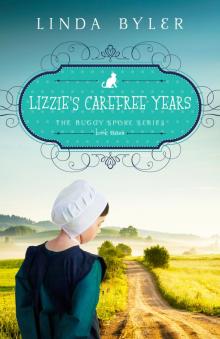 Lizzie's Carefree Years
Lizzie's Carefree Years The More the Merrier
The More the Merrier Love in Unlikely Places
Love in Unlikely Places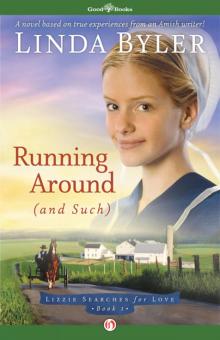 Running Around (and Such)
Running Around (and Such) Wild Horses
Wild Horses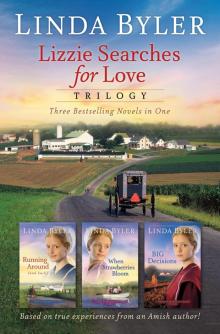 Lizzie Searches for Love Trilogy
Lizzie Searches for Love Trilogy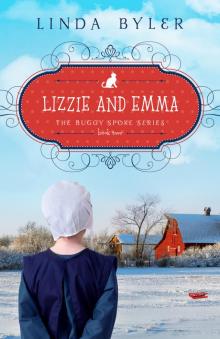 Lizzie and Emma
Lizzie and Emma Little Amish Matchmaker
Little Amish Matchmaker The Witnesses
The Witnesses The Healing
The Healing Home Is Where the Heart Is
Home Is Where the Heart Is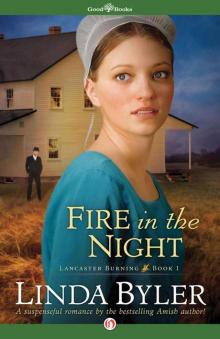 Fire in the Night
Fire in the Night When Strawberries Bloom
When Strawberries Bloom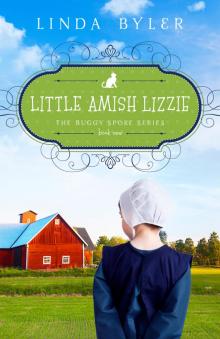 Little Amish Lizzie
Little Amish Lizzie Which Way Home?
Which Way Home? The Homestead
The Homestead Sadie’s Montana Trilogy
Sadie’s Montana Trilogy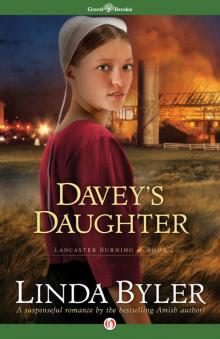 Davey's Daughter
Davey's Daughter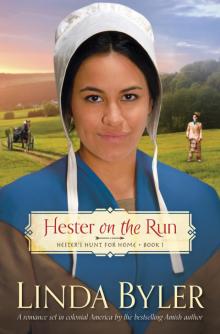 Hester on the Run
Hester on the Run Disappearances
Disappearances Big Decisions
Big Decisions Becky Meets Her Match
Becky Meets Her Match Hope on the Plains
Hope on the Plains Christmas Visitor
Christmas Visitor